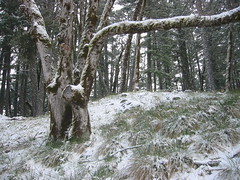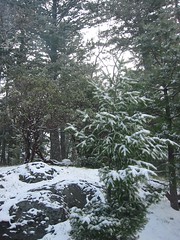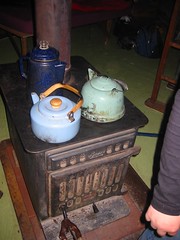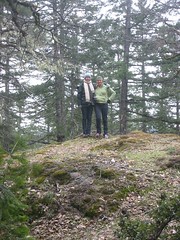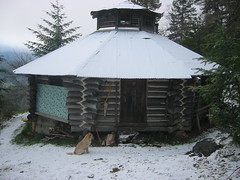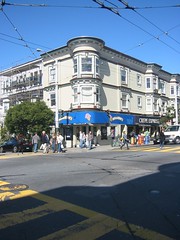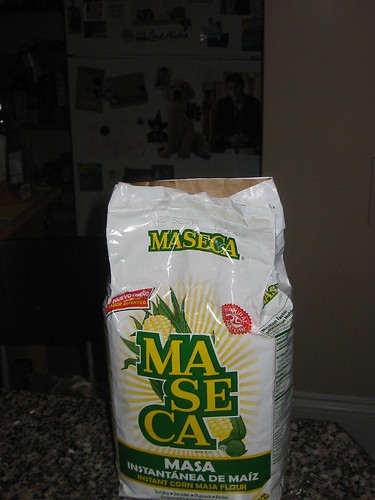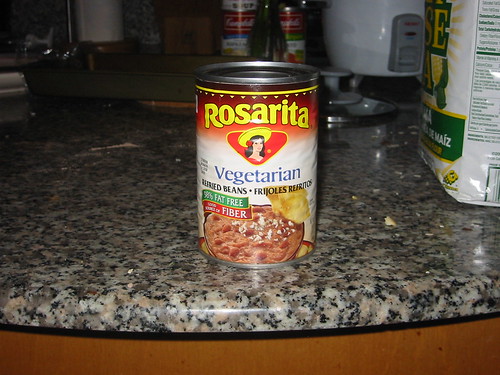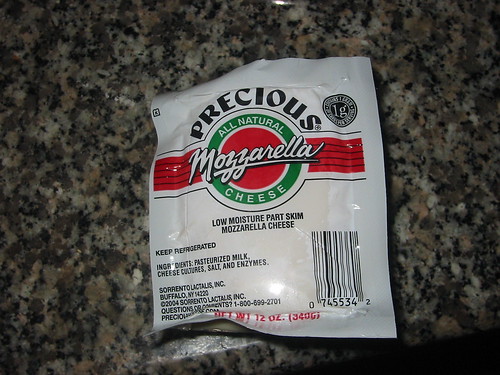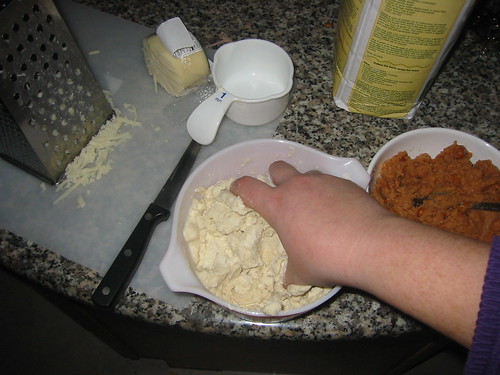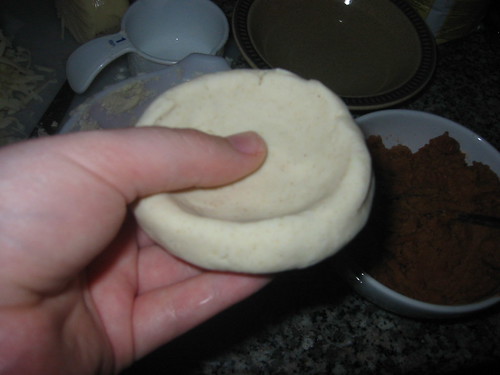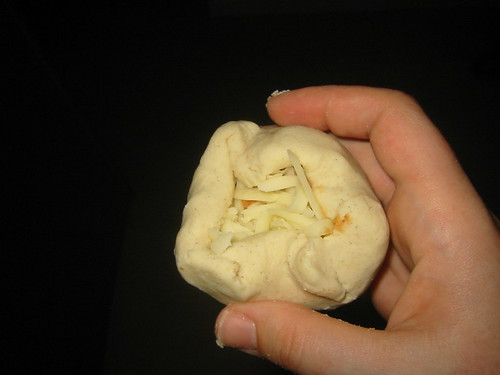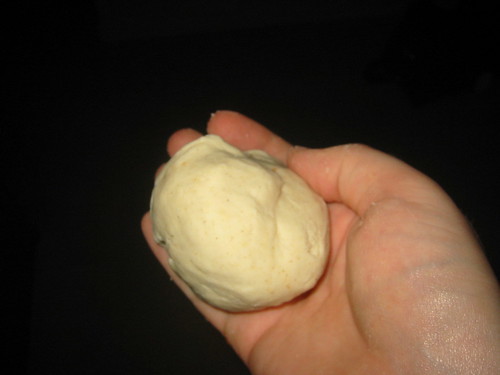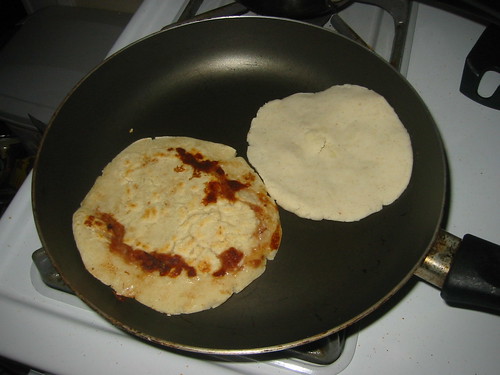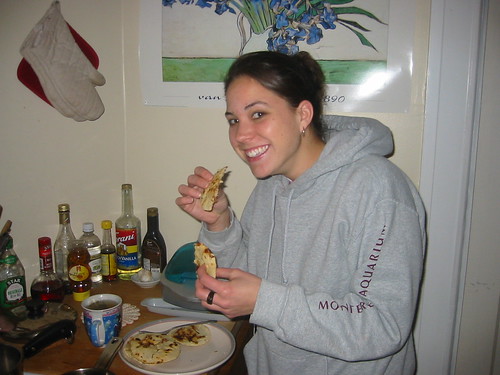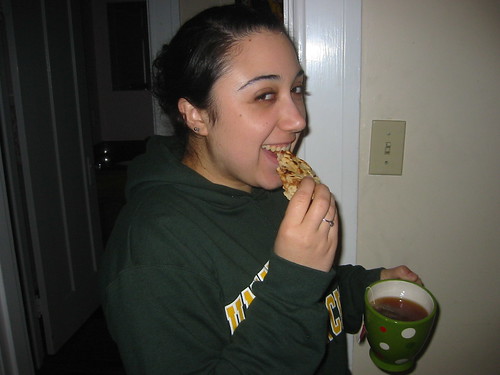For my Digital Literacy class this Tuesday we attended a lecture at the
San Francisco Public Library by Sarah Houghton-Jan, a.k.a. the
Librarian in Black. She is the Digital Futures Manager at the
San José Public Library, and the focus of her talk was on the future of libraries. She identified some of the issues that libraries are facing and talked about some things she sees for the future of libraries.
She talked about a lot, so this is a selection of some of her main points. I'll look forward to reading other people's accounts of/thoughts on the lecture.
She said that libraries aren't used to change, and when technology began to develop so rapidly, libraries were slow to catch on. In the meantime, many companies and the population in general moved way ahead. As a result, libraries lost their role as primary sources of information, being replaced with online resources. At the same time, however, the number of digital library users is growing exponentially. Those are users which only use the library's online resources and never come into the physical library building. She said that libraries are not doing a very good job of counting those people because they never see them. These users are becoming unhappy because their needs are not being addressed. Her advice to libraries: listen to the digital users.
She went through quite a few reasons people don't like or don't use libraries. One problem is that if you want a popular item, a new item, or something the library doesn't have, it's a long and potentially expensive process to get a hold of it. If the library has it but it's checked out, you can put a hold on it, but then you have to wait till that person returns it, and one or more people could have put holds on it ahead of you, meaning you'll have to wait that much longer. Another option is interlibrary loan (ILL), which is slow, complicated, and often costs money (when I worked at
Gleeson Library, I would process ILL requests occasionally, and it was simpler than she described, but it is a slow process). She said that she and her husband, who both work in libraries and could literally have materials delivered to their desks, often resort to buying things online so they don't have to wait for them from the library. Something that some libraries have experimented with is when a patron wants something the library doesn't have, the library orders it from
Amazon and has it shipped directly to the patron. Apparently Amazon will do some preliminary processing (e.g. barcode, labeling) for the library before sending it. It's turned out to be cheaper and faster than ILL. She has a blog entry dealing with this
here. Be sure to read the comments. Even if this became common, I still see an important place for ILL. This is probably more applicable in academic libraries than public libraries, but a lot of things aren't available on Amazon (*gasp*). Many of the ILL requests I processed were for journal articles, for example. I would go up in the stacks, find the bound volume of periodicals, make a photocopy, scan it (most of the time), and send it to the library that requested it. We had this nifty software that is standard enough that most libraries had it, and we could send the document electronically straight from the scanning software; otherwise we would fax or snail mail. I asked her her thoughts on alternatives like
Link+ (similar to ILL but among a smaller number of libraries geographically close to each other, way faster, very easy, and free), and she seemed to think it can be good, but if users don't find what they're looking for there, they tend to give up and think that's their last/only option, which is not good.
I wonder how common it is for people to buy stuff when they can't get it immediately from the library. Besides books for my classes, which I usually need for a long period of time, and may need to mark up, I have a really hard time buying books when I know I can get them for free. It has been rare for me to want a book that was not available through any of the libraries I can access (including the Link+ network). Usually that's only been when I'm researching obscure topics for a class. When I do buy books (usually for school), I rarely buy books new if it's possible to get them used for cheaper. If I thought to myself, "Hey, I'd like to read ____" and my library didn't have it on hand, I would not just go ahead and buy it, especially not if I could order it through Link+ and get it within a week. Even if that weren't available, books are expensive, and I wouldn't spend $20 on a whim, especially one I would only want to read once. Maybe I'm just cheap/poor. (As my dad says, "You already have a book." Next time I'm home, I want to take pictures of the huge numbers of books in my house to share with the internet. We have a building in our backyard that used to be a garage, but we converted into a "library room." It is
filled with books. I'll save that for a later blog entry.) However, if the only option to get a book a library doesn't have on hand is to buy it, that brings up serious issues of access across economic levels. That's what's so great about libraries: they're free. They bridge economic divides, making information available to everyone. Libraries should do whatever they can to maintain and promote that.
Moving on from that, something interesting she said was that digital rights management is a huge problem for libraries in terms of home access to digital materials. I never would have thought about this, but it makes a lot of sense. She thinks libraries can play a big role in changing this. Along similar lines, she told us that libraries have a very few choices for where to buy their catalog software, and they have to keep paying hundreds of thousands of dollars to continue using it - not because they're getting new features or upgrades, but just because the companies say they have to. Because of this, libraries are starting to develop open source catalog software. This is something else she sees for libraries' futures. Nice.
Another thing she says libraries need to do is embrace the democratization of information and expertise. Librarians need to let go of telling people the "right way" to do things. Libraries need to allow the user to have more control and incorporate things like tagging, social labeling, decentralized data creation (such as user-created reading lists), and social organization of data. This is interesting and potentially cool, but the little librarian inside me keeps saying "no, no, people will mess stuff up." Fortunately, the little librarian inside of me is probably wrong because people have shown that they're good at this sort of thing and they'll improve what's already there. It's also a really good way to engage people with their libraries.
This is really just a smattering of what she covered in her excellent talk, but I'm sure the things she spoke about will come up again, and I will blog some more.


